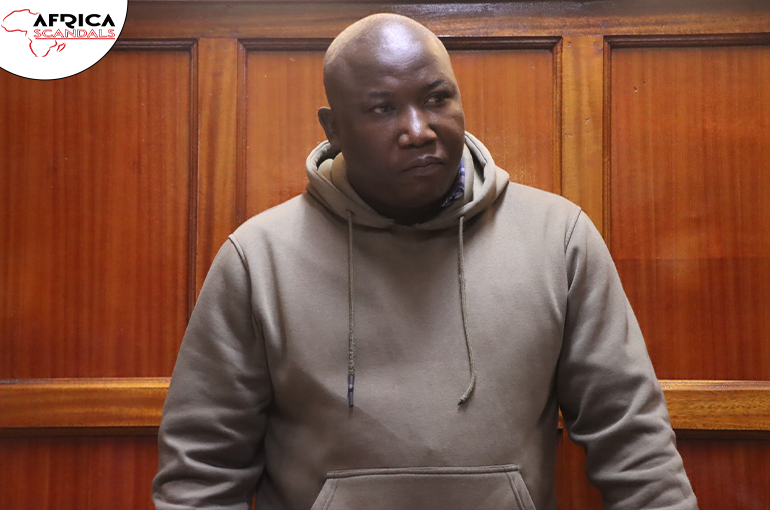A Middle-Aged Man Samuel Aluta Muyela Arraigned at Nairobi Court for Selling Infringing Mathematical Tables

Samuel Aluta Muyela
In a recent development, a middle-aged man Samuel Aluta Muyela was arraigned today at a Nairobi Court, facing serious charges of selling infringing copies of four-figure mathematical tables. This case, contrary to Section 38 of the Copyright Act, has garnered significant attention. According to the prosecution, Samuel Aluta Muyela was found in possession of 1033 infringing copies of the “Four Figure Mathematical Table 7th Edition” on December 30, 2023. This article delves into the details of the case, the charges, and the broader implications for copyright law enforcement.
Samuel Aluta Muyela?
Samuel Aluta Muyela, the accused in this case, is a middle-aged man who has found himself embroiled in a legal battle. On December 30, 2023, Samuel was discovered with a significant number of infringing copies of a well-known educational resource, raising alarms about the scale of copyright infringement activities.
The Importance of the “Four Figure Mathematical Table, 7th Edition”
The “Four Figure Mathematical Table 7th Edition” is an essential educational tool, widely used by students in Kenya. The copyright for this publication is held by the Kenya National Examination Council (KNEC). Unauthorized reproduction of such a critical educational resource not only affects the council’s financial interests but also jeopardizes the integrity of educational materials used by students.
Details of the Charges Infringing Copyright Works
Samuel faces charges of possessing 1033 infringing copies of the “Four Figure Mathematical Table 7th Edition.” The copyright for these works is officially registered under the Kenya National Examination Council. The illegal reproduction and sale of these materials constitute a serious violation of copyright laws.
Possession of Printing Machines
In addition to the infringing copies, Samuel was also charged with possessing printing machines. These machines were allegedly used to produce 1128 copies of the same copyrighted book. The presence of such equipment suggests a well-organized operation intended to mass-produce counterfeit educational materials.
Appearance Before the Magistrate
Samuel Aluta Muyela appeared before Milimani Law Courts Magistrate Benmark Ekhubi. During the proceedings, Samuel denied all charges brought against him. Despite his denial, the prosecution presented substantial evidence indicating his involvement in the illegal activities.
Bail Conditions
Following his plea, Samuel was released on a Ksh 300,000 bond, with an alternative cash bail of Ksh 200,000. These bail conditions are significant, reflecting the seriousness of the charges. They are intended to ensure Samuel’s continued cooperation with the legal process.
Section 38 of the Copyright Act
The charges against Samuel fall under Section 38 of the Copyright Act, which outlines the penalties for copyright infringement. This section of the law is designed to protect the rights of copyright holders and deter unauthorized reproduction and distribution of protected works. Violations of this act can result in severe penalties, including substantial fines and imprisonment.
Legal Precedents
Cases of this nature are not uncommon, and the legal system has established precedents for dealing with such infringements. Previous cases have shown that courts take a firm stance against copyright violations, particularly when they involve educational materials that are critical for academic success.
Reaction from the Local Community
The news of Samuel’s arrest has elicited strong reactions from the local community. Many residents are concerned about the prevalence of counterfeit goods and the broader implications for local businesses and consumers. The sale of counterfeit educational materials undermines the value of genuine products and can have detrimental effects on students’ education.
Potential Effects on Local Businesses
Local businesses, particularly those involved in the sale of educational materials, are also impacted by such activities. The proliferation of counterfeit goods can erode consumer trust and lead to financial losses for legitimate businesses that adhere to copyright laws.
Reactions from the Educational Sector
Educators and academic institutions have expressed serious concerns about the availability of counterfeit educational materials. The integrity of educational resources is paramount to ensuring that students receive accurate and reliable information. The sale of infringing copies undermines this integrity and can lead to widespread academic issues.
Statements from Educational Authorities
Educational authorities, including the Kenya National Examination Council, have emphasized the importance of protecting copyrighted materials. They have called for stricter enforcement of copyright laws to safeguard the interests of students and educators alike.
Government officials have reiterated their commitment to combating copyright infringement. They have highlighted the need for robust legal frameworks and enforcement mechanisms to protect intellectual property rights and maintain the quality of educational materials.
Future Measures to Prevent Infringement
Law enforcement agencies have announced plans to implement stricter measures to prevent similar incidents in the future. These measures include increased surveillance, public awareness campaigns, and collaboration with educational institutions to identify and address copyright violations promptly.
Copyright laws are essential for protecting the rights of creators and ensuring that they receive fair compensation for their work. These laws incentivize creativity and innovation, allowing creators to invest time and resources into developing high-quality content.
Ensuring Quality and Authenticity
Copyright protection also plays a crucial role in ensuring the quality and authenticity of products available to consumers. In the case of educational materials, it is vital to maintain the accuracy and reliability of the information provided to students.
The arraignment of Samuel Aluta Muyela underscores the importance of adhering to copyright laws and the severe consequences of violating them. This case serves as a reminder of the critical role that copyright protection plays in safeguarding the interests of creators and consumers alike. As the legal proceedings continue, it remains essential for all stakeholders to uphold the principles of copyright enforcement to maintain the integrity of educational materials and support the innovation and creativity of content creators.


